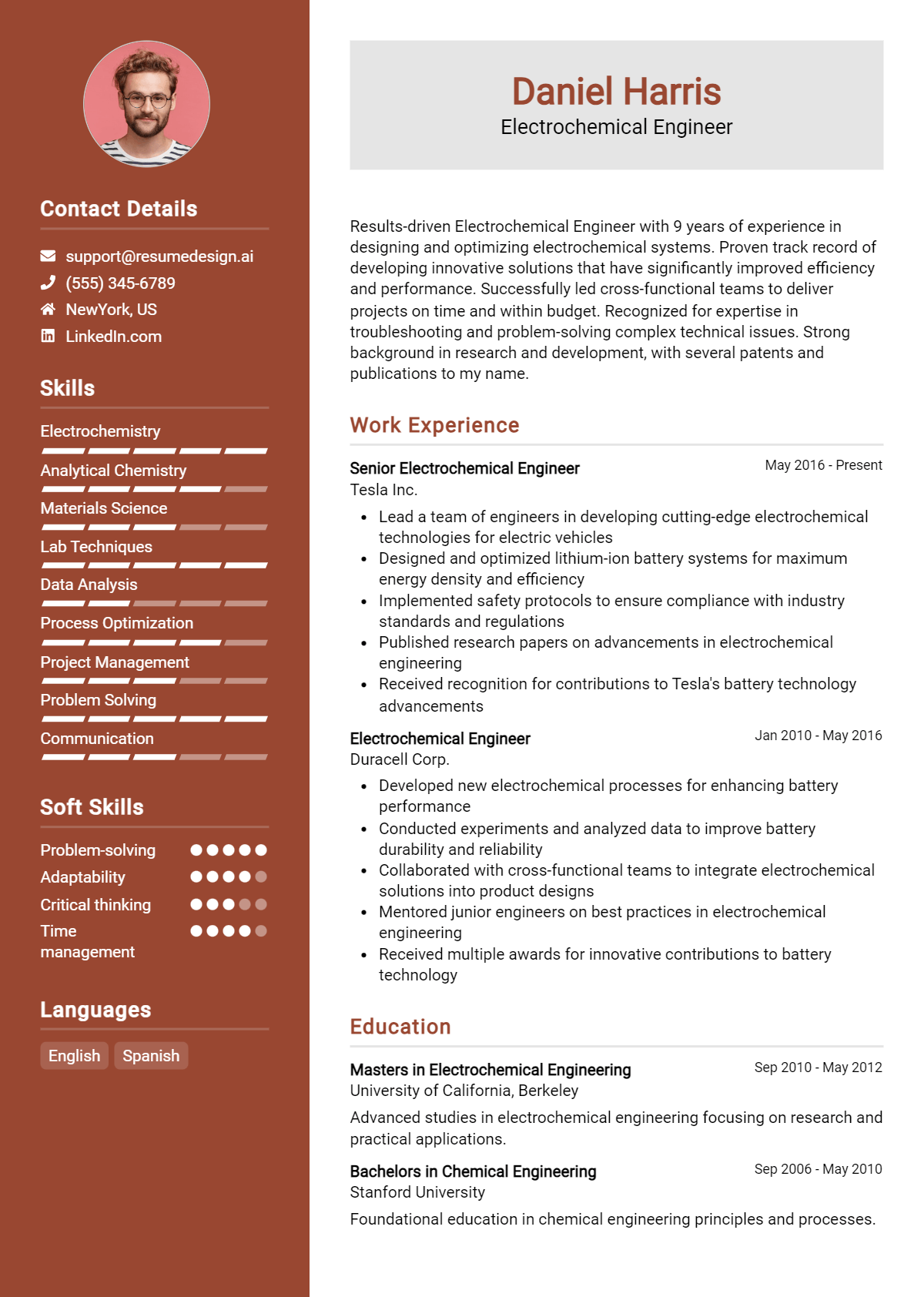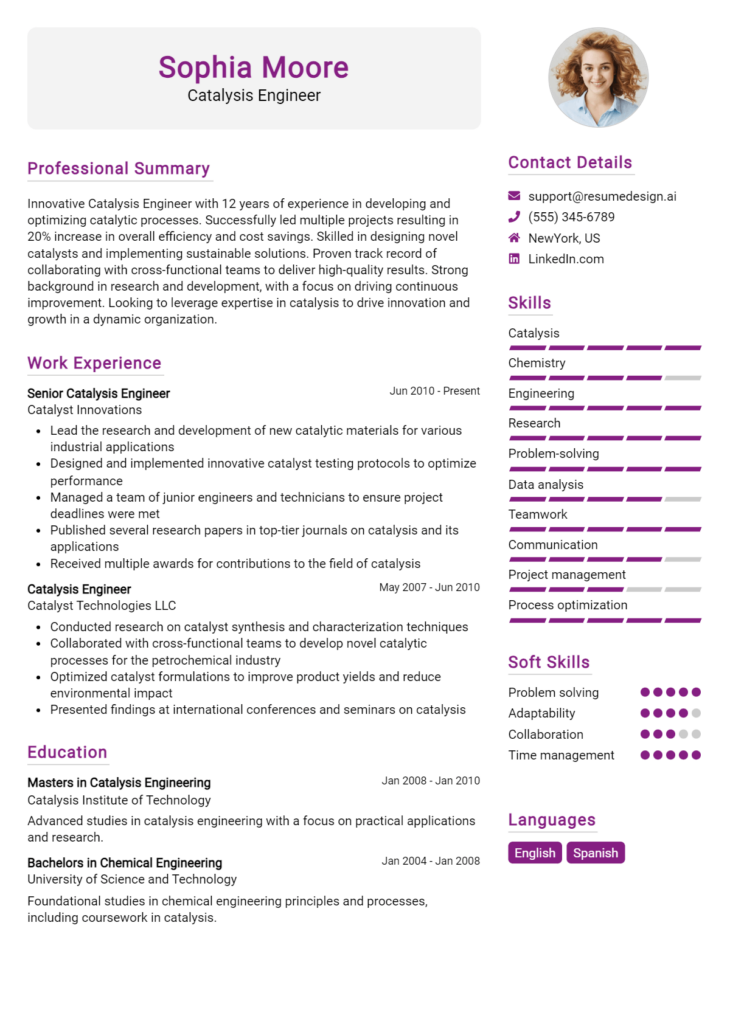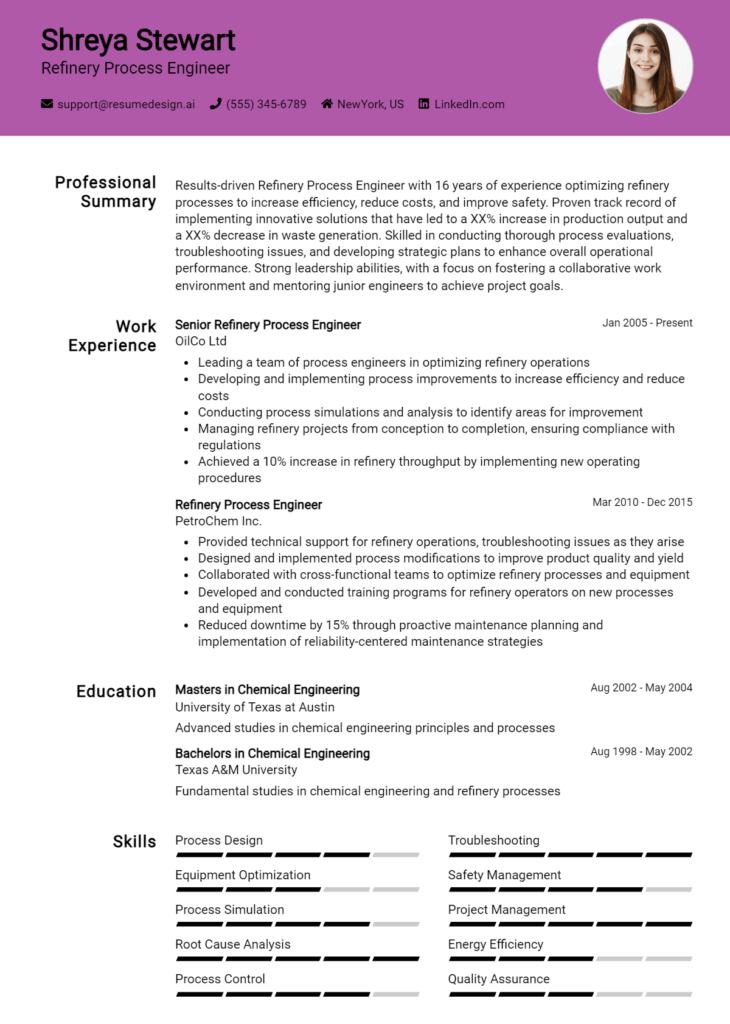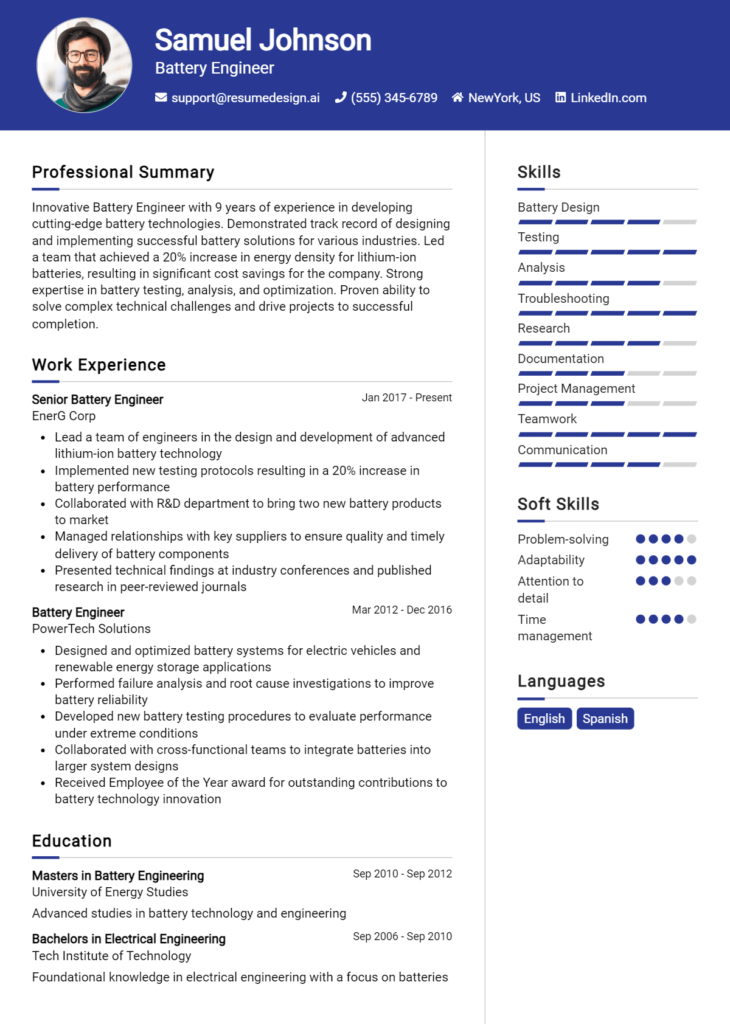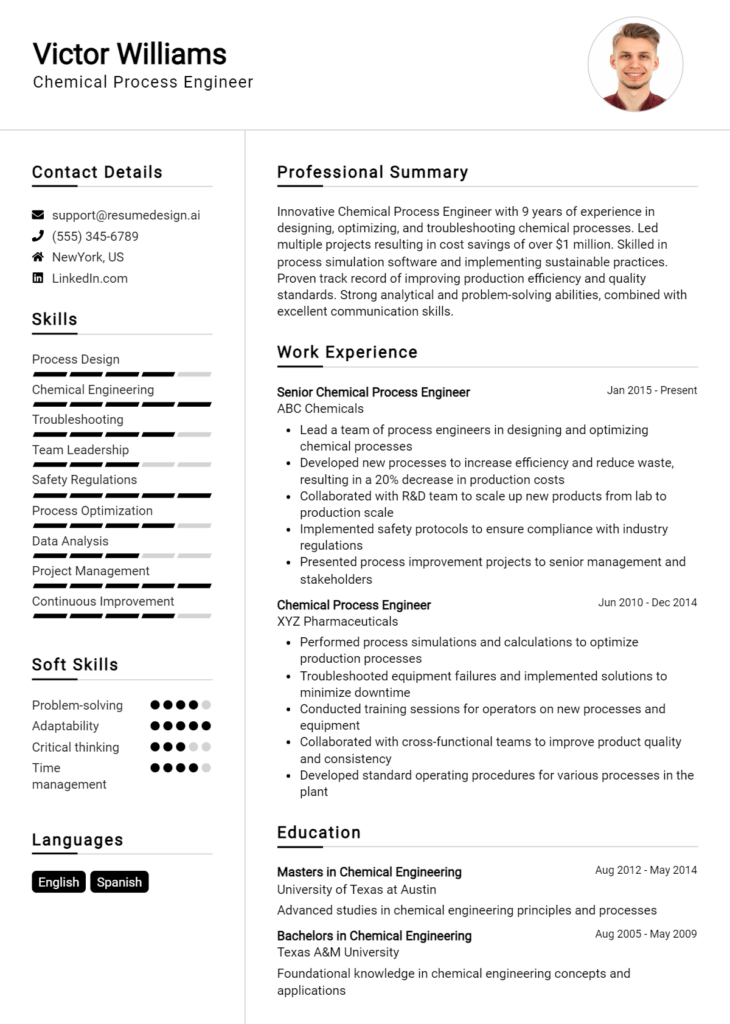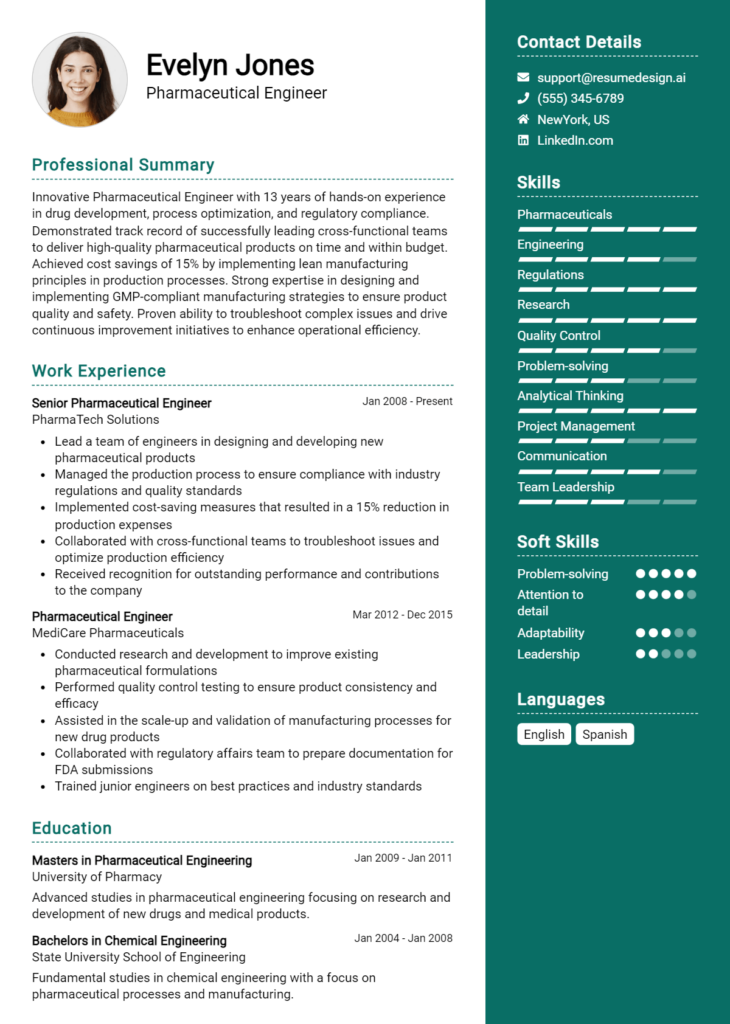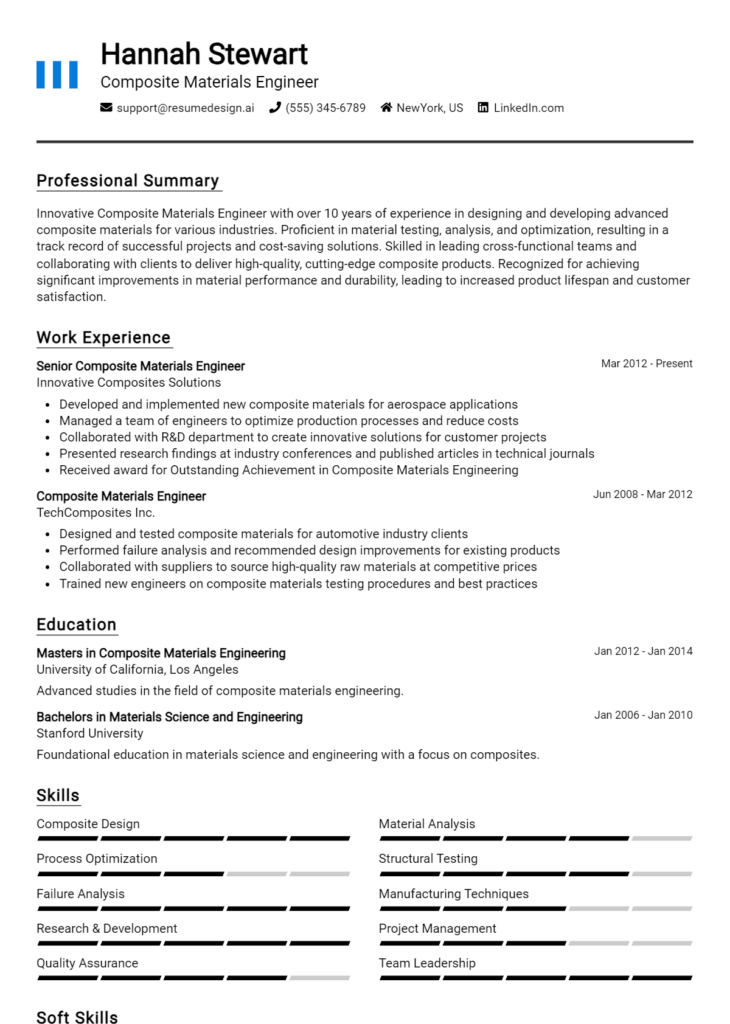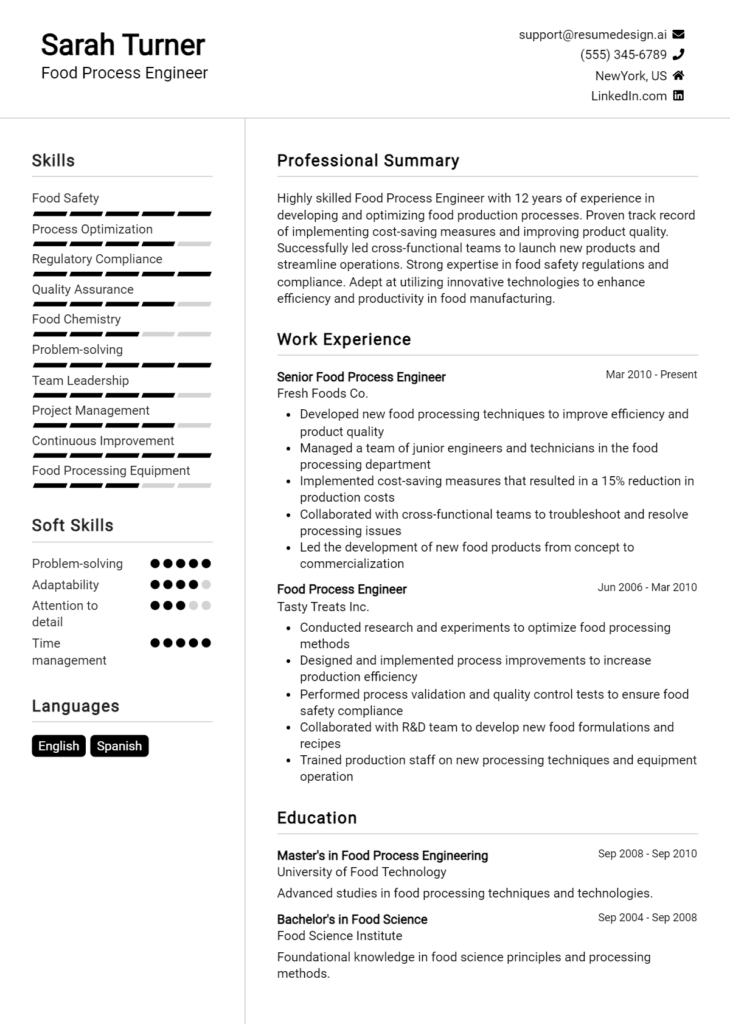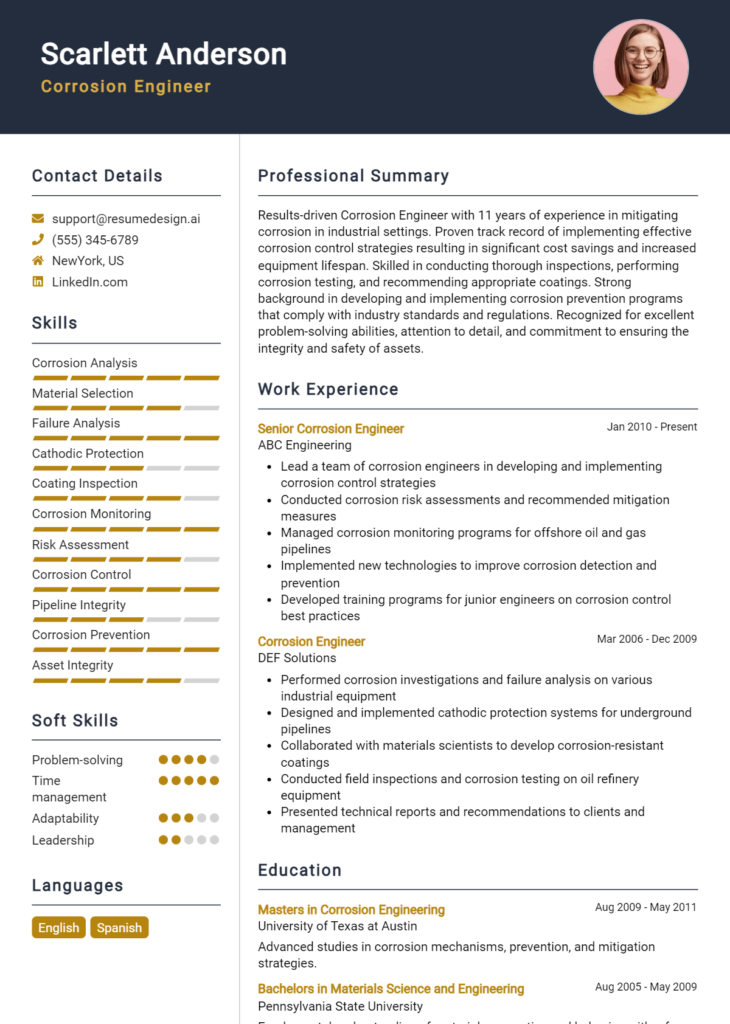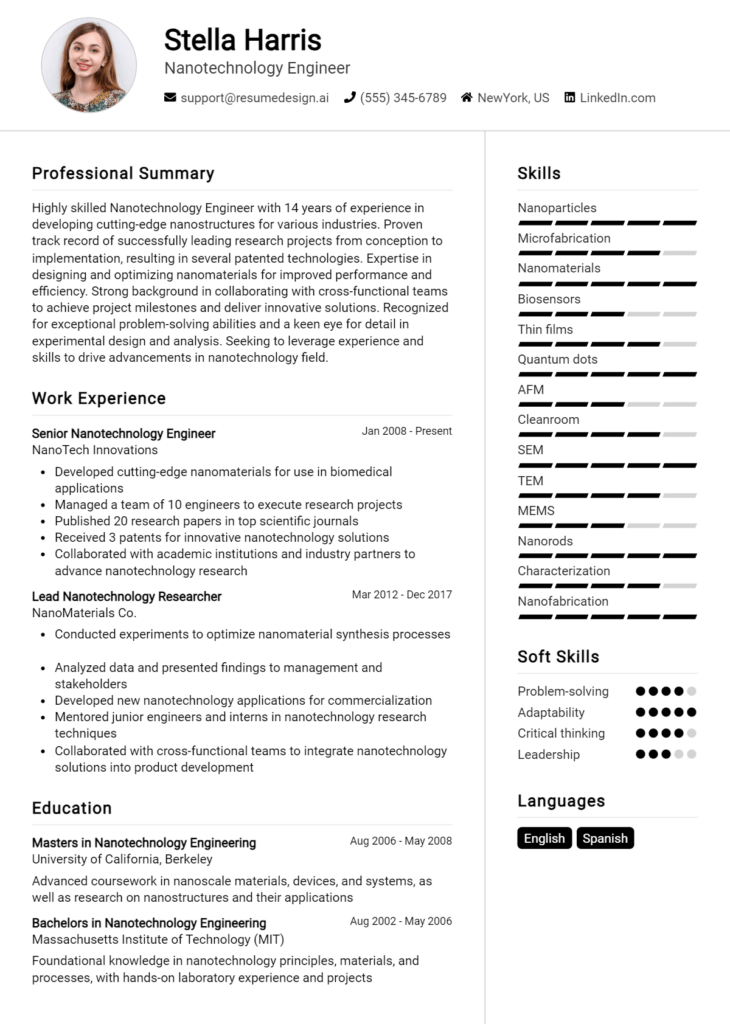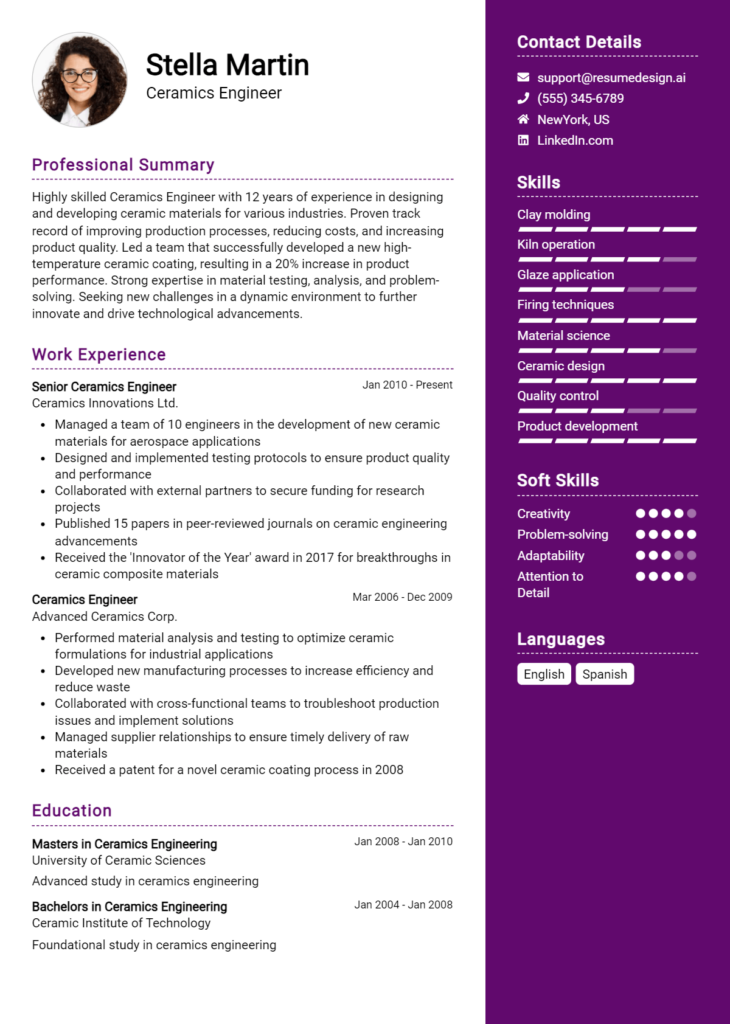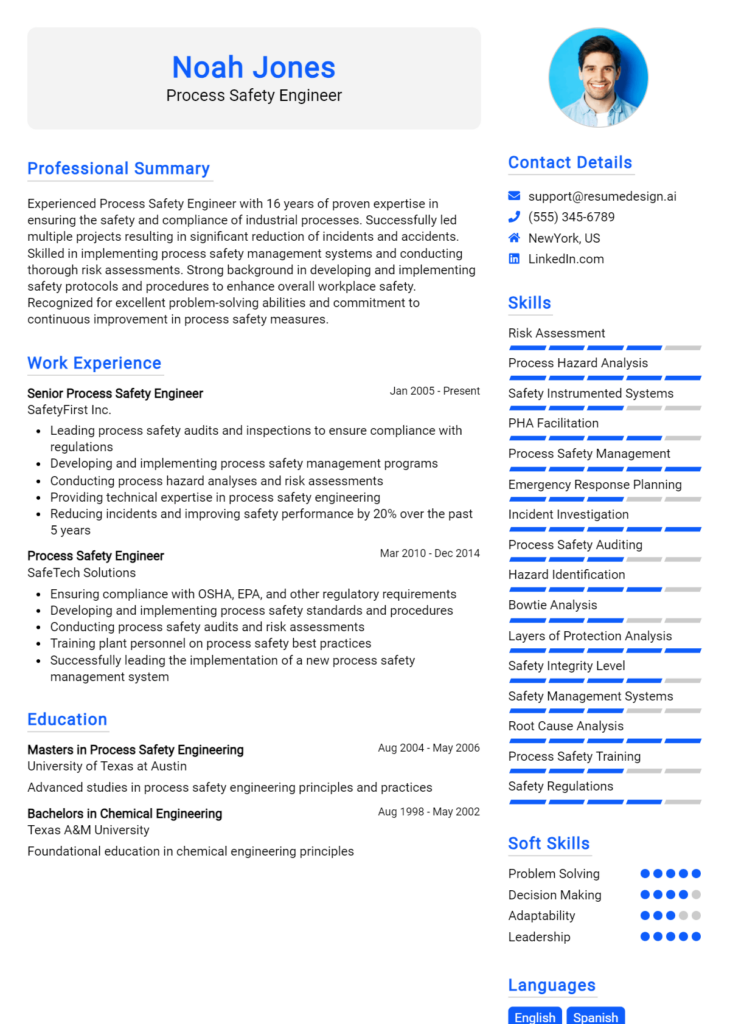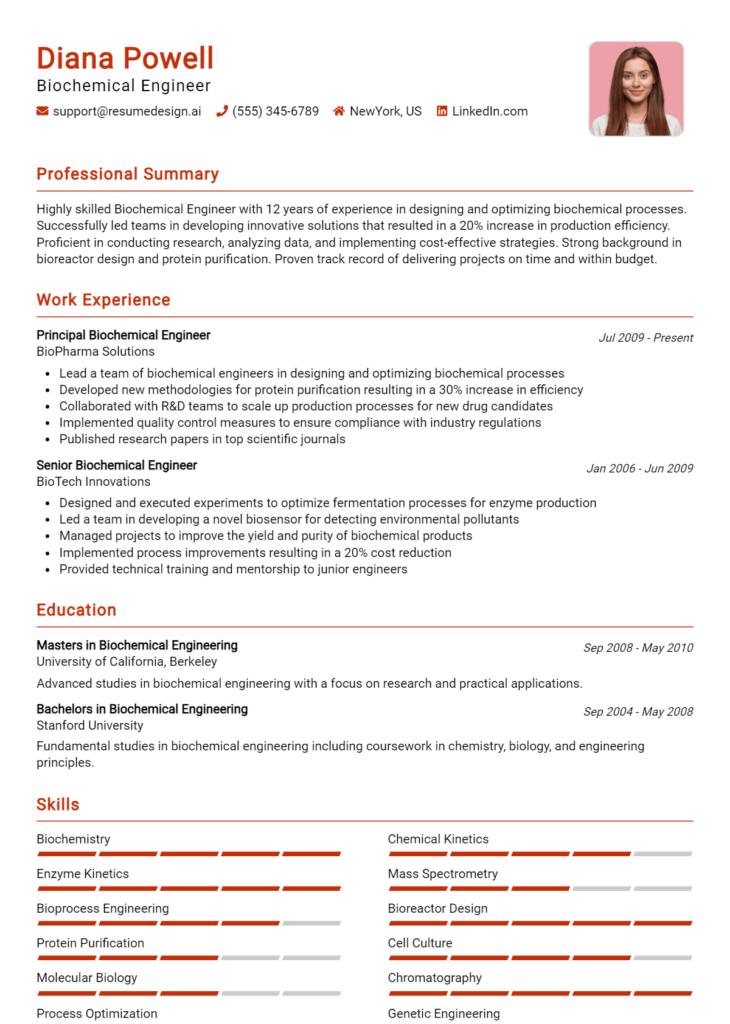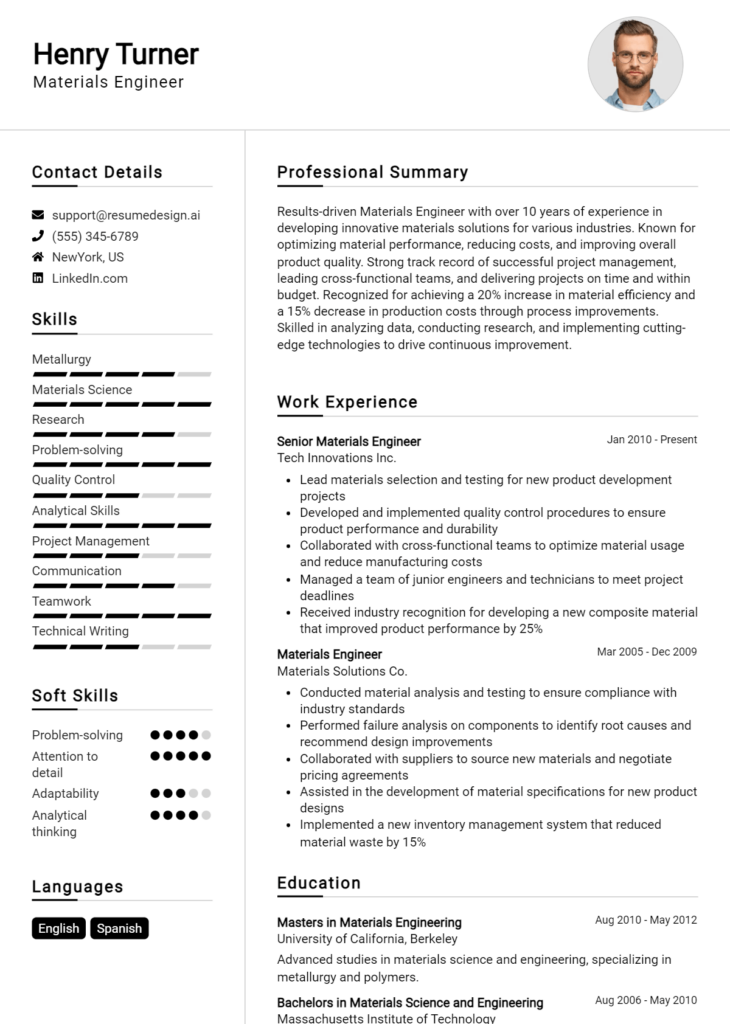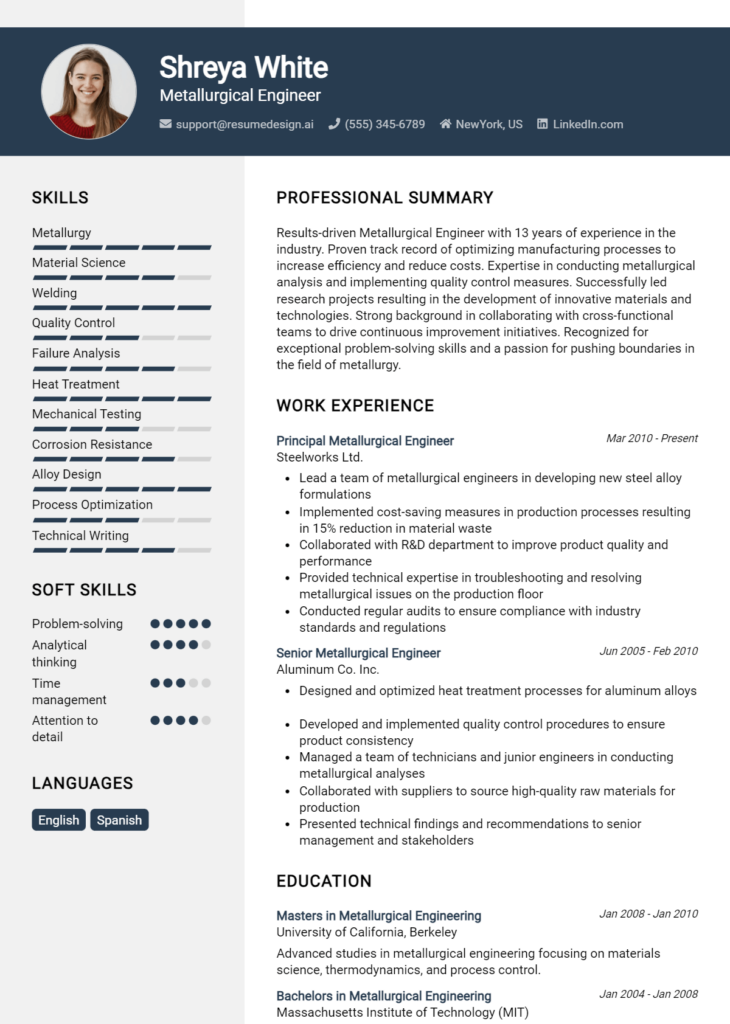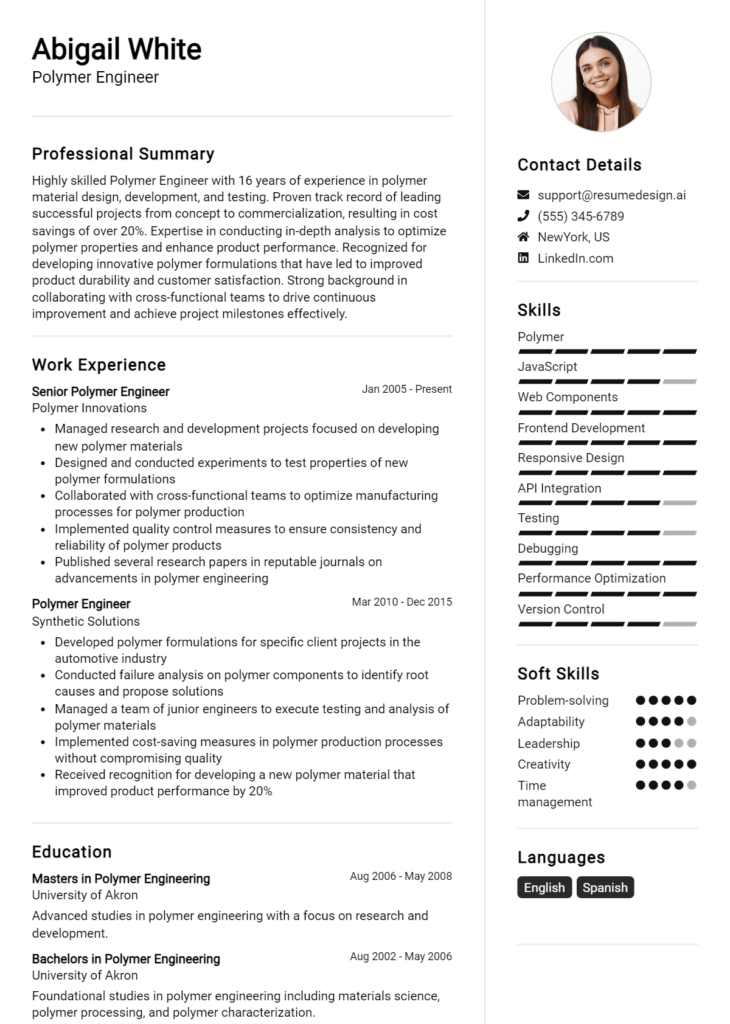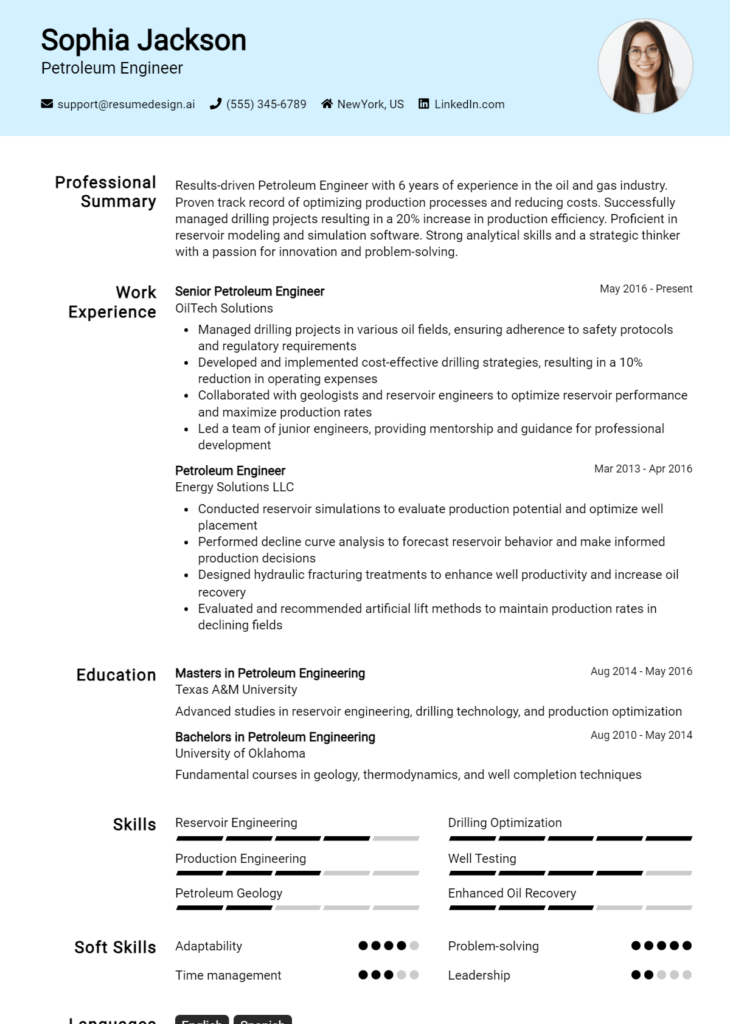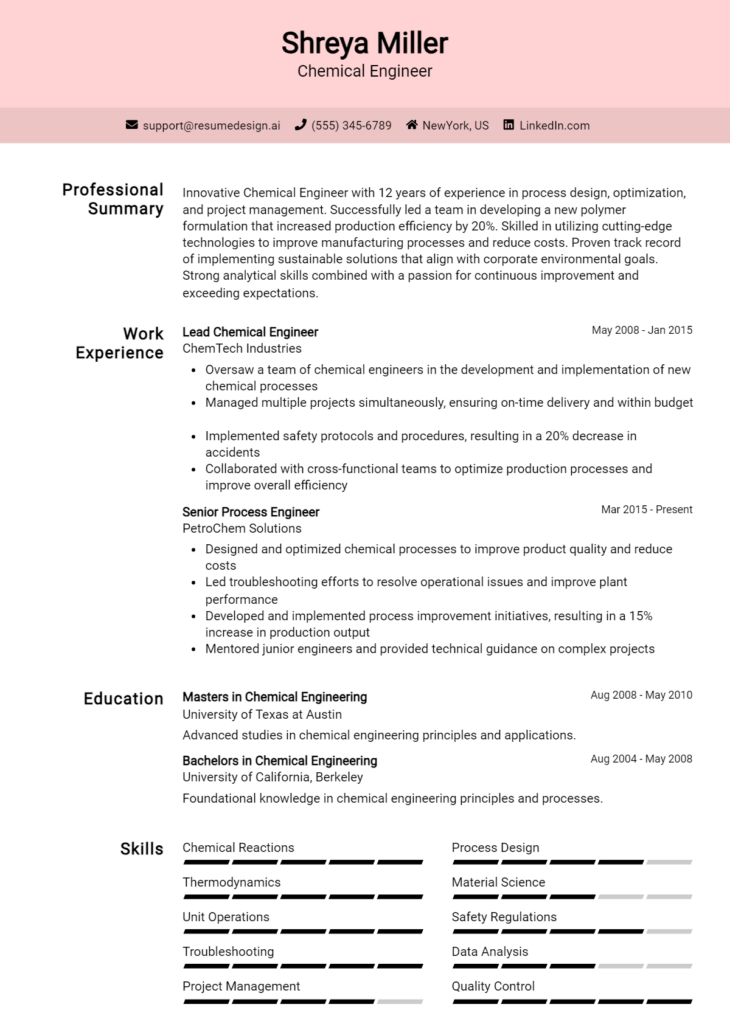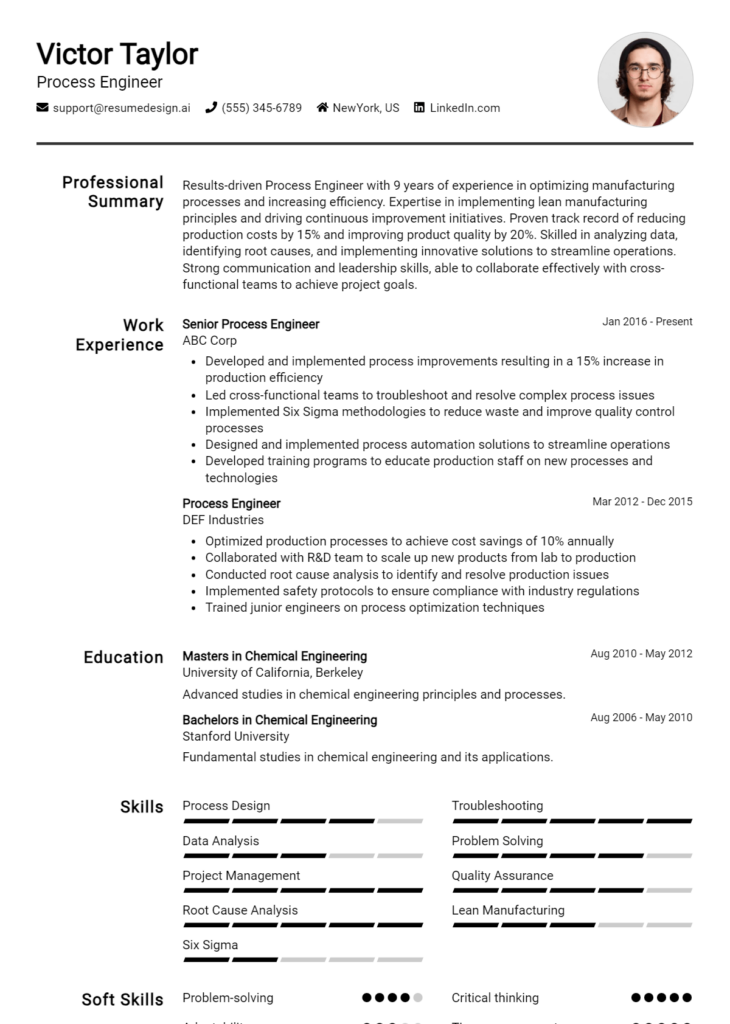Electrochemical Engineer Core Responsibilities
Electrochemical Engineers play a crucial role in developing and optimizing processes that involve chemical reactions driven by electricity. They are responsible for designing electrochemical systems, conducting experiments, analyzing data, and collaborating with cross-functional teams, including R&D, production, and quality assurance. Strong technical knowledge, operational proficiency, and problem-solving skills are essential for troubleshooting and improving processes. These competencies not only contribute to project success but also align with organizational goals, making a well-structured resume vital for showcasing these qualifications effectively.
Common Responsibilities Listed on Electrochemical Engineer Resume
- Design and develop electrochemical cells and systems.
- Conduct experiments to investigate electrochemical reactions.
- Analyze data and interpret results for process optimization.
- Collaborate with interdisciplinary teams to integrate solutions.
- Develop protocols for testing and quality assurance.
- Monitor and troubleshoot electrochemical processes.
- Stay updated on industry trends and technological advancements.
- Prepare technical reports and documentation for stakeholders.
- Implement safety measures in laboratory and production environments.
- Assist in the scale-up of electrochemical processes from lab to production.
- Evaluate and select materials for electrochemical applications.
- Provide technical support and training to team members.
High-Level Resume Tips for Electrochemical Engineer Professionals
A well-crafted resume is essential for Electrochemical Engineer professionals, as it often serves as the first impression a candidate makes on potential employers. In a competitive job market, your resume should not only reflect your technical skills and expertise but also highlight your significant achievements in the field. It is imperative that your resume stands out and conveys your unique qualifications effectively. This guide will provide practical and actionable resume tips specifically tailored for Electrochemical Engineer professionals, ensuring that your application captures the attention of hiring managers.
Top Resume Tips for Electrochemical Engineer Professionals
- Tailor your resume for each job application by mirroring keywords and phrases from the job description.
- Highlight relevant experience in electrochemistry, including specific projects or research that showcase your expertise.
- Quantify your achievements by including metrics such as performance improvements, cost savings, or enhanced efficiencies.
- Emphasize industry-specific skills, such as electrochemical modeling, battery technology, or corrosion management.
- Include a summary statement at the top that encapsulates your professional background and key competencies.
- Utilize technical jargon and terminology relevant to the electrochemical field, demonstrating your familiarity with industry standards.
- Showcase certifications, licenses, or training that are pertinent to electrochemistry and engineering practices.
- Incorporate a section for publications or presentations if applicable, as they can enhance your credibility and expertise.
- Keep the layout clean and professional, using bullet points for easy readability and ensuring consistent formatting throughout.
By implementing these tips, you can significantly increase your chances of landing a job in the Electrochemical Engineer field. A well-structured resume that clearly demonstrates your qualifications, experiences, and achievements will make you a competitive candidate, helping you stand out to potential employers and ultimately advance your career in this dynamic industry.
Why Resume Headlines & Titles are Important for Electrochemical Engineer
In the competitive field of electrochemical engineering, a well-crafted resume headline or title serves as a critical first impression for job seekers. These short phrases can immediately capture the attention of hiring managers, summarizing a candidate's key qualifications in a powerful and succinct way. A strong headline should not only reflect the applicant's expertise but also be directly relevant to the position being applied for. By doing so, it sets the tone for the rest of the resume and increases the likelihood of standing out in a crowded applicant pool.
Best Practices for Crafting Resume Headlines for Electrochemical Engineer
- Keep it concise—aim for one impactful phrase.
- Be specific about your role—use "Electrochemical Engineer" rather than a vague term.
- Highlight your strongest qualifications or achievements.
- Use industry-relevant keywords to attract attention.
- Focus on the value you bring to potential employers.
- Avoid clichés and generic phrases that lack impact.
- Tailor your headline to align with the job description.
- Consider including a notable certification or degree if relevant.
Example Resume Headlines for Electrochemical Engineer
Strong Resume Headlines
"Innovative Electrochemical Engineer with 5+ Years in Battery Technology Development"
“Results-Driven Electrochemical Engineer Specializing in Fuel Cell Design and Optimization”
“Experienced Electrochemical Engineer with Proven Success in R&D for Sustainable Energy Solutions”
Weak Resume Headlines
“Engineer Seeking Job”
“Electrochemical Engineer with Experience”
The strong headlines are effective because they immediately convey specific skills, years of experience, and areas of specialization, making it clear what the candidate has to offer. In contrast, the weak resumes fail to impress due to their vagueness and lack of detail. They do not provide any compelling information that would spark interest in the candidate, making it easy for hiring managers to overlook them in favor of more impactful options.
Writing an Exceptional Electrochemical Engineer Resume Summary
A well-crafted resume summary is crucial for an Electrochemical Engineer, as it serves as the first impression a hiring manager has of a candidate. This concise statement quickly captures attention by succinctly showcasing key skills, relevant experience, and notable accomplishments that align with the job requirements. An impactful summary not only highlights the candidate's technical expertise in electrochemistry but also emphasizes their ability to contribute to the organization's goals. Tailoring the summary to the specific job can make a significant difference in standing out from other applicants, making it an essential component of a successful resume.
Best Practices for Writing a Electrochemical Engineer Resume Summary
- Quantify Achievements: Use specific numbers and metrics to demonstrate the impact of your work.
- Focus on Key Skills: Highlight the most relevant technical and soft skills that match the job description.
- Tailor for the Job: Customize your summary for each application to reflect the specific requirements and responsibilities of the role.
- Be Concise: Keep your summary brief, ideally within 3-5 sentences, to maintain the reader's attention.
- Use Action Verbs: Start sentences with strong action verbs to convey confidence and proactivity.
- Include Relevant Certifications: Mention any certifications or licenses that are pertinent to the electrochemical field.
- Showcase Problem-Solving Skills: Highlight examples of how you have successfully addressed challenges in previous roles.
- Maintain Professional Tone: Use industry-specific language while keeping it professional and approachable.
Example Electrochemical Engineer Resume Summaries
Strong Resume Summaries
Dynamic Electrochemical Engineer with over 5 years of experience in developing high-efficiency battery systems, resulting in a 20% increase in energy density. Proven expertise in electrochemical modeling and simulation, with a strong focus on innovative solutions that enhance performance and sustainability.
Detail-oriented Electrochemical Engineer skilled in optimizing electrode materials, having successfully reduced production costs by 15% while improving cycle life by 30%. Adept at collaborating with cross-functional teams to drive projects from conception to deployment.
Results-driven Electrochemical Engineer with a PhD in Electrochemistry and a track record of publishing research in top-tier journals. Leveraged advanced knowledge in corrosion science to develop protective coatings that increased lifespan of components by 40% in harsh environments.
Weak Resume Summaries
An experienced engineer looking for opportunities in electrochemistry. I have worked on various projects and have a good understanding of the field.
Electrochemical Engineer with skills in batteries and corrosion. I aim to contribute to a company that values hard work and dedication.
The strong resume summaries are considered effective because they provide specific examples of achievements, quantifiable results, and relevant skills that directly relate to the role of an Electrochemical Engineer. In contrast, the weak summaries lack detail and fail to convey any significant accomplishments or unique qualifications, making them less compelling to hiring managers.
Work Experience Section for Electrochemical Engineer Resume
The work experience section of an Electrochemical Engineer's resume is crucial as it serves as a platform to demonstrate the candidate's technical skills, leadership capabilities, and commitment to delivering high-quality products. This section highlights not only the specific roles and responsibilities held but also showcases the tangible contributions made to previous employers. By quantifying achievements and aligning work experience with industry standards, candidates can effectively convey their expertise and value to potential employers, setting themselves apart in a competitive job market.
Best Practices for Electrochemical Engineer Work Experience
- Focus on quantifiable results by including metrics such as efficiency improvements, cost savings, or production increases.
- Highlight specific technical skills relevant to electrochemical engineering, including software proficiencies and laboratory techniques.
- Demonstrate leadership abilities by mentioning team management experiences and successful project completions.
- Align your experiences with industry standards and practices to show familiarity with current technologies and methodologies.
- Include collaborative projects to emphasize teamwork and the ability to work effectively with cross-functional teams.
- Use action verbs to convey a sense of proactivity and impactful contributions.
- Detail challenges faced and how they were overcome to showcase problem-solving skills.
- Tailor the experiences to the job description to ensure relevance and alignment with the prospective employer's needs.
Example Work Experiences for Electrochemical Engineer
Strong Experiences
- Led a team of 5 engineers in the development of a new battery system, resulting in a 25% increase in energy density, which contributed to a $500,000 increase in annual revenue.
- Implemented a quality control protocol that reduced product defects by 30%, enhancing overall customer satisfaction and reducing returns.
- Collaborated with cross-functional teams to design and launch a fuel cell prototype, achieving 15% higher efficiency than previous models in testing phases.
- Authored a research paper on advanced electrochemical processes that was published in a leading industry journal, establishing the company as an innovator in the field.
Weak Experiences
- Worked on various projects related to electrochemistry.
- Assisted in the lab with experiments and other tasks.
- Helped the team improve processes.
- Participated in meetings to discuss project updates.
The examples listed as strong experiences demonstrate clear, quantifiable outcomes, specific technical leadership, and successful collaboration, showcasing the candidate's impact and expertise in the field. Conversely, the weak experiences lack detail and measurable achievements, making them less compelling and failing to illustrate the candidate's true capabilities and contributions to potential employers.
Education and Certifications Section for Electrochemical Engineer Resume
The education and certifications section of an Electrochemical Engineer resume plays a crucial role in establishing the candidate's qualifications and expertise in the field. This section not only highlights the academic background of the candidate but also showcases industry-relevant certifications and ongoing learning efforts that are essential for keeping pace with advancements in electrochemistry. By providing details about relevant coursework, specialized training, and certifications, candidates can significantly enhance their credibility and demonstrate alignment with the specific requirements of the job role, making them more appealing to potential employers.
Best Practices for Electrochemical Engineer Education and Certifications
- Include relevant degrees in chemical engineering, materials science, or electrochemistry.
- List industry-recognized certifications like Certified Electrochemical Technician (CET) or similar credentials.
- Highlight specialized training programs related to battery technology, fuel cells, or corrosion science.
- Detail specific coursework that aligns with the job description, such as thermodynamics or electrochemical systems.
- Use clear formatting to distinguish between degrees and certifications for easy readability.
- Update the section regularly to reflect any new qualifications or achievements.
- Tailor the education and certifications section to match the requirements of the job application.
- Include any relevant academic honors or awards to showcase academic excellence.
Example Education and Certifications for Electrochemical Engineer
Strong Examples
- Bachelor of Science in Chemical Engineering, University of California, Berkeley, 2021
- Certified Electrochemical Technician (CET), National Institute for Certification in Engineering Technologies, 2022
- Advanced Battery Technology Course, Massachusetts Institute of Technology (MIT), 2023
- Master's Degree in Materials Science with a focus on Electrochemistry, Stanford University, 2023
Weak Examples
- Bachelor of Arts in History, University of Texas, 2018
- Certification in Basic First Aid, American Red Cross, 2020
- Online Course in General Business Management, 2021
- High School Diploma, Local High School, 2016
The provided examples illustrate the distinction between strong and weak qualifications for an Electrochemical Engineer. Strong examples consist of relevant degrees and certifications that directly relate to the field of electrochemistry, showcasing the candidate's preparedness and specialization. In contrast, weak examples include unrelated degrees and certifications that do not contribute to the candidate's qualifications in electrochemical engineering, which may detract from their overall appeal to potential employers.
Top Skills & Keywords for Electrochemical Engineer Resume
In the competitive field of electrochemical engineering, showcasing the right skills on your resume is crucial for standing out to potential employers. Skills not only highlight your technical proficiency and ability to solve complex problems, but they also demonstrate your capacity to work collaboratively in multidisciplinary teams. An effective resume should reflect a balanced combination of both hard and soft skills, which are essential for navigating the challenges of this innovative field. By emphasizing these skills, you can clearly communicate your qualifications and readiness to contribute to cutting-edge projects in electrochemical technology.
Top Hard & Soft Skills for Electrochemical Engineer
Soft Skills
- Problem-solving
- Critical thinking
- Communication
- Team collaboration
- Project management
- Adaptability
- Attention to detail
- Creativity
- Time management
- Leadership
Hard Skills
- Electrochemical analysis techniques
- Battery technology
- Corrosion science
- Materials characterization
- Computational modeling
- Chemical synthesis
- Instrumentation and control systems
- Data analysis and interpretation
- LabVIEW programming
- Process optimization
By incorporating a well-rounded mix of these skills, along with relevant work experience, you can craft a compelling resume that effectively showcases your qualifications as an electrochemical engineer.
Stand Out with a Winning Electrochemical Engineer Cover Letter
I am excited to apply for the Electrochemical Engineer position at [Company Name], as advertised on [where you found the job posting]. With a robust academic background in electrochemistry and hands-on experience in battery technology development, I am confident in my ability to contribute to your team and support your mission of driving innovation in energy solutions.
In my previous role at [Previous Company Name], I successfully led a project that focused on improving the efficiency of lithium-ion batteries, resulting in a 15% increase in energy density. My expertise in electrochemical analysis, combined with my proficiency in software tools such as COMSOL Multiphysics and MATLAB, has equipped me with the skills necessary to tackle complex problems. I am adept at conducting experiments, analyzing data, and translating findings into actionable insights that drive product development.
Collaboration is a cornerstone of my work ethic; I enjoy working cross-functionally with chemists, material scientists, and product engineers to achieve common goals. I am particularly drawn to [Company Name] because of your commitment to sustainability and innovation in energy storage technologies. I am eager to bring my technical skills and creative problem-solving approach to your team, contributing to the development of cutting-edge electrochemical solutions that meet the evolving needs of the industry.
Thank you for considering my application. I look forward to the opportunity to discuss how my background, skills, and enthusiasms align with the goals of [Company Name]. I am excited about the possibility of contributing to your team and advancing the field of electrochemical engineering together.
Common Mistakes to Avoid in a Electrochemical Engineer Resume
When crafting a resume for an Electrochemical Engineer position, it’s essential to present your skills and experiences in a clear and compelling way. However, many candidates make common mistakes that can hinder their chances of landing an interview. Understanding these pitfalls can help you create a more effective resume that highlights your qualifications and expertise in the field of electrochemistry.
Using Generic Templates: Many candidates rely on one-size-fits-all templates that may not suit the specific requirements of an electrochemical engineering role. Tailoring your resume to reflect the unique demands of the position is crucial.
Lack of Relevant Keywords: Failing to include industry-specific keywords can result in your resume being overlooked by applicant tracking systems. Make sure to incorporate terms related to electrochemical processes, materials science, and relevant technologies.
Overloading with Technical Jargon: While technical expertise is vital, using excessive jargon can make your resume difficult to read. Strive for a balance between technical language and clear explanations to ensure that a broader audience can understand your qualifications.
Neglecting Soft Skills: Focusing solely on technical skills can lead to an incomplete picture of your capabilities. Highlighting relevant soft skills, such as teamwork, problem-solving, and communication, can demonstrate your ability to collaborate effectively in a multidisciplinary environment.
Inadequate Project Descriptions: Simply listing job duties without providing context or impact is a missed opportunity. When describing projects, include specific outcomes, technologies used, and your individual contributions to showcase your achievements.
Ignoring Education and Certifications: In a specialized field like electrochemical engineering, your educational background and relevant certifications are critical. Ensure that these details are prominently featured and up-to-date.
Using Passive Language: Passive language can make your accomplishments seem less impactful. Use active verbs and assertive language to convey your contributions and successes clearly.
Failing to Proofread: Spelling and grammatical errors can create a negative impression and detract from your professionalism. Carefully proofread your resume or seek feedback from peers to ensure it is polished and error-free.
Conclusion
As we’ve explored the multifaceted role of an Electrochemical Engineer, it's clear that this position demands a unique blend of technical expertise, critical thinking, and innovative problem-solving skills. From designing and optimizing electrochemical processes to conducting research on new materials and technologies, Electrochemical Engineers play a pivotal role in advancing energy solutions and sustainable practices. Additionally, staying updated with industry trends and advancements is crucial for success in this dynamic field.
In light of this, it's essential to ensure that your resume reflects the specific skills and experiences that potential employers are seeking. Take a moment to review your Electrochemical Engineer resume and consider how you can tailor it to highlight your qualifications effectively.
To assist you in this process, there are various tools available that can enhance your job application materials. Explore our selection of resume templates to find a design that suits your style and profession. For a more personalized approach, try our resume builder to create a standout resume that showcases your achievements and expertise. Additionally, you can gain inspiration from our collection of resume examples tailored for Electrochemical Engineers. Don’t forget to complement your application with a professional introduction using our cover letter templates.
Take action today to refine your resume and increase your chances of landing your ideal Electrochemical Engineer position!

